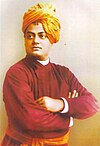Vishwanath Datta
Vishwanath Datta | |
|---|---|
| Born | 1835 Calcutta, Bengal, British India |
| Died | 25 February 1884 (aged 49) Calcutta, Bengal, British India |
| Language | Bengali |
| Nationality | Indian |
| Subject | Attorney-at-law, novelist |
| Spouse | Bhubaneshwari Devi (m.1851) |
| Children | 6 including Narendranath & Bupendranath |
| Parents | Durgaprasad Dutta (father) Shyamasundari Devi (mother) |
Vishwanath Datta (1835 — 25 February 1884) was a Bengali lawyer,[1] philanthropist and novelist. He was the father of Swami Vivekananda, Mahendranath Dutta and Bhupendranath Dutta.[2]
Early life
Vishwanath was born to an aristocratic Hindu family of North Calcutta. His father Durgaprasad (1816—1850/55) had preferred the life of Sannyas and left home when Vishwanath was only six years old. His mother Shyamasundari Devi was an educated woman. She wrote a Bengali poetical work “Gangabhakti Tarangaini” (Bengali: গঙ্গাভক্তি তরঙ্গিনী). Durgaprasad and Shyamasundari had two children - a daughter, who died at a young age, and then a son, Vishwanath. Shyamasundari died of cholera in 1847. At the time of his mother's death, Vishwanath was only 12 years old. The now orphaned Vishwanath was brought up by his uncle Kaliprasad Datta and his wife Vishweshwari Devi.
It so happened that in somewhere between 1845 and 1846, Durgaprasad returned to Calcutta. He was recognised by one of his neighbours who locked him in a small room in his house so that he cannot escape and remain in a desperate condition as a sannyasi. He was locked in this room for 3 days. At last, on the third day the neighbour's wife Sarita Devi took pity on him and helped him escape from the house. He entered in Gourmohan Addy's school or Oriental Seminary. After completion of graduation, in 1859, Datta worked as a clerk under an attorney, Charles Peter.[3]
Career
Datta was an enlightened person of the 19th century, free from religious superstitions, known for his charity and liberal outlook.[1] He was well versed in Sanskrit, Hindi, Persian, Arabic and Urdu languages.[4]
He married Bhuvaneswari Devi (1841 — 25 July, 1911), daughter of Nandalal Bose and Raghumani Devi, in 1851 and had nine children. Among them, 4 daughters and 3 sons survived - Haramoni, Swarnamoyee, Kiranbala, Jogindrabala, Narendranath, Mahendranath and Bhupendranath. Narendranath Dutta, his fifth child and first son, who later became famous as Swami Vivekananda, was born in 1863.[5]
In 1866 he applied for the post of proctor to Barnes Peacock, the first Chief Justice of Calcutta High Court. His prayer was approved by Justice Walter Morgan (judge). Datta also maintained a law firm in Kolkata named Dhar & Datta. Later he faced serious economic troubles for frequent litigation and lawsuits among Datta family.[6]
Literary works
Datta wrote a Bengali autobiographical novel named Sulochana based on a joint family dispute. In 1882 the novel was first published in Kolkata (then "Calcutta").[7]
Death
Vishwanath Datta was working as a successful lawyer when he died in 1884 at the age of 49. He was suffering from diabetes and heart ailments.
After his death, the responsibility of the family fell on his son Narendranath, who found solace in the company of Ramakrishna Paramhansa, eventually becoming his disciple assuming the name Swami Vivekananda.
References
- ^ a b Vivekananda, Swami. Vivekananda: His Call to the Nation. Advaita Ashrama (A publication branch of Ramakrishna Math, Belur Math). ISBN 978-81-7505-917-7.
- ^ Chowdhury, Satyam Roy (2016-09-01). VIVEKANANDA FOR YOU ( ENGLISH ). Techno India.
- ^ Mohapatra, Kalpana (1996). Political Philosophy of Swami Vivekananda. Northern Book Centre. ISBN 9788172110796.
- ^ P. R. Bhuyan (2003). Swami Vivekananda: Messiah of Resurgent India. ISBN 9788126902347. Retrieved 12 February 2018.
- ^ VOL LI, No 20 (4 May 2013). "Swami Vivekananda: A Life Divine". Retrieved 12 February 2018.
{{cite web}}: CS1 maint: numeric names: authors list (link) - ^ Samkara (2011). The Monk as Man: The Unknown Life of Swami Vivekananda. ISBN 9780143101192. Retrieved 12 February 2018.
- ^ "Viswanath Datta". Retrieved February 12, 2018.

